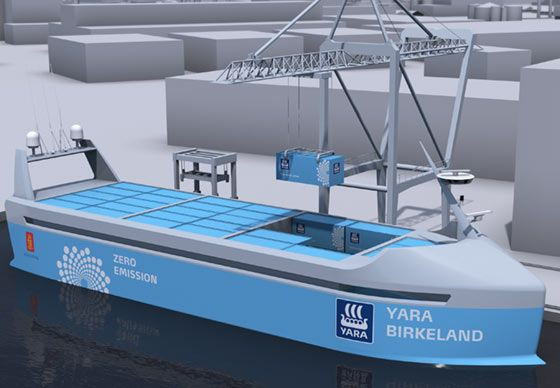Self-Driving Ships: Norway Companies Developing Autonomous Cargo Boats

Self-driving cars are a focus for a lot of tech companies, but in Europe, a group of companies are working to bring self-driving technology to an unexpected area: the ocean.
Two companies in Norway are working on an autonomous shipping boat that wouldn’t need a human crew. Firms Yara International ASA and Kongsberg Gruppen are developing the Yara Birkeland and want to begin test runs with the boat starting in 2018, according to the Wall Street Journal.
Read: Self-Driving Car Startup Faraday Future Won't Build $1 Billion Las Vegas Factory
Check out these videos from Kongsberg Gruppen to get an idea of what the Birkeland can do:
According to Kongsberg Gruppen, the ship will have a storage capacity of 100 to 150 twenty-foot equivalent units and will feature batteries as a major power source. On the inside, the Birkeland features technology similar to current self-driving cars. The ship will use Lidar, cameras, radars and other physical sensors to power its autonomous functions.
Initially, the Birkeland will have a limited route in southern Norway. The ship will run between the port cities of Herøya, Brevik and Larvik in an estimated 37 nautical mile route. Both companies will also plan to maintain three separate control centers designed to monitor functions like the Birkeland’s condition, decision-making and general surveillance.
Yara International and Kongsberg Gruppen have an extended timeline for testing on the Yara Birkeland. According to Kongsberg, testing with a small human crew is slated to start in 2018 and the companies hope to have the ship be running fully autonomously in 2020.
As one of the more ambitious projects in self-driving ship development, the Birkeland comes with significant costs. According to the Journal, the ship is expected to cost $25 million to develop.
Read: Nvidia And Baidu Form Partnership On Artificial Intelligence, Self-Driving Cars
However, the savings for the ship are expected to come from other areas. While the technology for self-piloting ships isn’t necessarily powerful enough yet for vessels that go between continents, it’s expected to become increasingly popular for ships that are traveling between countries on shorter routes. Since the Birkeland won’t need a large human crew or fuel, it will also cost less to run during its routes.
For Yara International and Kongsberg Gruppen, the upsides of self-driving ships mirror the incentives other self-driving car companies are exploring on land. Within the past few years, self-driving technology has seen massive investment from companies like Tesla and Lyft as they try to be the first to bring fully autonomous cars to consumers. Like with the Birkeland, companies have also explored development for self-driving shipping trucks to bring similar upgrades and cost-savings to businesses.
© Copyright IBTimes 2025. All rights reserved.




















